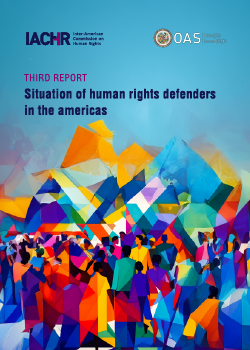
Press Release
IACHR publishes Third Report on the Situation of Human Rights Defenders in the Americas
October 16, 2025
Contact info
IACHR Press Office
Distribution List
Washington, DC—The Inter-American Commission on Human Rights (IACHR) published today its Third Report on the Situation of Human Rights Defenders in the Americas. This report provides up-to-date information about progress made and pending challenges to protect the rights of human rights defenders, building on the observations the IACHR made in its regional reports of 2011 and 2006.
More than 13 years after the publication of its Second Report on the Situation of Human Rights Defenders in the Americas, the IACHR notes with concern that human rights defenders continue to work in a hostile environment where their lives and personal integrity are constantly at risk.
The IACHR warns about the specific risks faced by defenders of land, territory, and the natural environment, as well as by indigenous and Afro-descendant leaders. The IACHR further notes the differentiated, intersectional risks faced by women and LGBTI persons who are rights defenders, based on their gender, sexual identity or orientation, and activism. The IACHR also highlights the risks that are inherent to the defense of individuals in human mobility contexts.
In this report, the IACHR addresses for the first time the specific situation of people who search for missing persons and defenders in cases concerning memory, truth, and justice, as well as of individuals who are active in the defense of sexual and reproductive rights.
The report shows that worrying levels of violence persist against all these groups. The risks they face go from smear campaigns and stigmatizing discourse to threats, attacks on personal integrity including murders, and disappearances. Despite being extremely serious, attacks on human rights defenders are shrouded in high levels of impunity.
Criminalization remains frequent and is exercised by both state and non-state actors to hamper the efforts of human rights defenders. It has even led to the forced exile of many defenders, so it is a form of repression with a serious impact on the exercise of the right to defend rights.
The defense of human rights in the Americas is being carried out in a shrinking civic space, as evidenced by unlawful surveillance and other forms of intervention. Further, various legislative and administrative frameworks have been adopted to impose more restrictive registration on civil society organizations, limit their scope for action, and disproportionately audit their funding, which might affect the right to freedom of association.
The report assesses States’ obligations based on the applicable inter-American standards, as well as the measures that have been adopted to ensure compliance and the challenges that remain. The IACHR welcomes the efforts made by some States in the Americas to enable progress in this field by creating national protection mechanisms; their willingness to comply with precautionary measures granted by the IACHR; and the creation of specialized public prosecutors’ offices to investigate crimes committed against human rights defenders.
However, the IACHR notes that various challenges remain, including weaknesses in the operations of national protection mechanisms for human rights defenders; the adoption of protection measures that do not reflect the prevailing risks; and the failure to make progress in investigations of crimes committed against human rights defenders, which leads to high levels of impunity.
In its report, the IACHR makes a series of recommendations to States in the Americas, with a view to bracing their efforts to protect and preserve the rights of human rights defenders. These recommendations include developing comprehensive public policies to protect and preserve the rights of rights defenders; granting effective, adequate protection measures with a differentiated intersectional approach in favor of individuals who are at risk; ensuring progress in investigations of crimes committed against rights defenders and ensuring punishment for all wrongdoers; and preventing criminalization and reviewing, finetuning, and/or revoking all crime categories and legislative frameworks in violation of the legality principle that are frequently used to criminalize the defense of human rights.
It is essential for States to adopt and reinforce measures to ensure that human rights defenders can do their work without threats or intimidation of any kind. Acknowledging the important role played by human rights defenders in all democratic societies ultimately depends on the determination and commitment of all branches of government and of States at every level of government.
The IACHR is an autonomous body of the Organization of American States (OAS) whose mandate is based on the OAS Charter and the American Convention on Human Rights. Its mission is to promote and defend human rights throughout the Americas and to serve as an advisory body to the OAS in this area. The IACHR consists of seven independent members elected by the OAS General Assembly who serve in a personal capacity and do not represent their countries of origin or residence.
No. 211/25
11:00 AM


